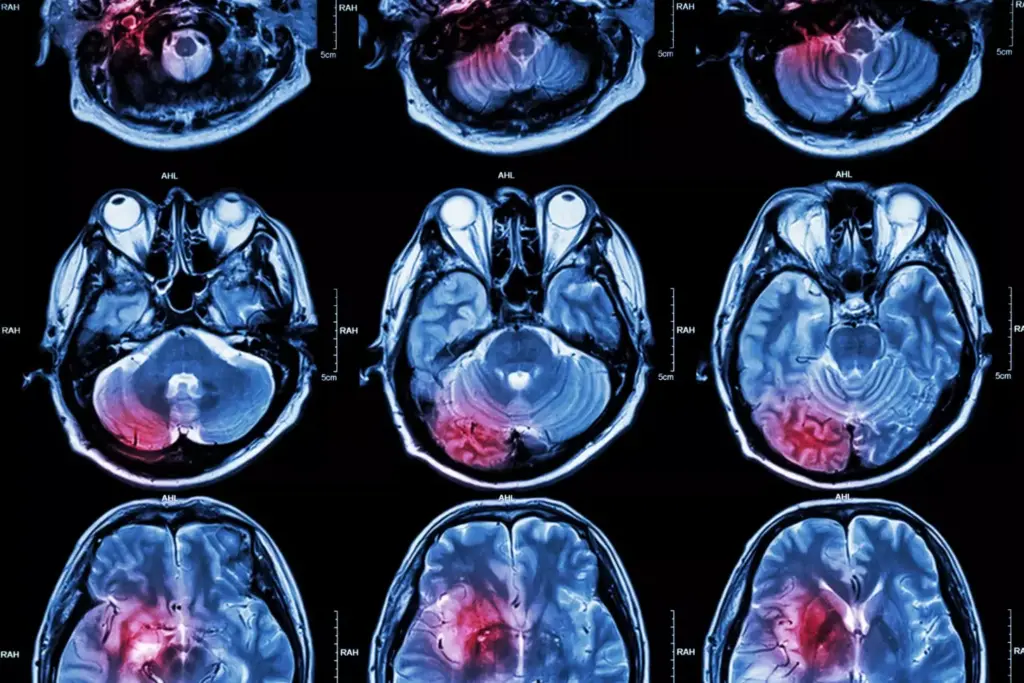Last Updated on November 4, 2025 by mcelik

Are you worried that your symptoms might be more than just anxiety? At Liv Hospital, we get it. Health issues can be scary and confusing. It’s important to know the warning signs of brain cancer early on.
Distinguishing between anxiety disorders and brain tumor symptoms is hard. Symptoms can look similar. But, signs like constant headaches, seizures, vision problems, and memory loss might mean something serious.
We’re here to help you understand. We’ll give you the info and support you need. This article will cover the 11 key signs of a brain tumor. We’ll also show you how to tell if they’re from anxiety or something more.

It’s important to know about brain cancer for early detection and treatment. Brain cancer, or brain tumors, are abnormal cell growths in the brain. We’ll look at how these tumors form and why their symptoms might seem like anxiety disorders.
Brain tumors come from different brain cells, like astrocytes and oligodendrocytes. Some tumors are benign, while others are malignant and dangerous. The growth of these tumors involves changes in genes and molecules.
As tumors grow, they put pressure on the brain. This can damage nearby brain areas, causing various problems.
Symptoms of brain tumors can look like anxiety disorders. This is because both can cause headaches, dizziness, and thinking problems. It can be hard to tell them apart.
To tell brain tumors apart from anxiety disorders, look at the symptoms’ duration, severity, and how they combine. Here’s a table showing some differences:
| Symptom | Brain Tumor | Anxiety Disorder |
|---|---|---|
| Headaches | Persistent, worsening over time | Variable, often related to stress |
| Dizziness | Can be constant, related to tumor location | Often episodic, related to anxiety attacks |
| Cognitive Disturbances | Progressive, can include memory loss and confusion | Variable, often related to anxiety levels |
Getting a correct diagnosis needs a detailed check-up, including scans and brain tests. It’s key for doctors to know the differences between brain tumor symptoms and anxiety disorders.

Persistent headaches can be more than just a minor issue. They might signal a serious health problem. While occasional headaches are common, persistent ones could mean something serious, like a brain tumor.
It’s important to know the signs of headaches linked to brain tumors. This helps in catching them early and treating them right. We’ll look at how to tell these headaches apart from those caused by anxiety. This will help you know when to see a doctor.
Headaches from brain tumors have unique signs. They include:
Anxiety headaches can seem like brain tumor headaches, making it hard to tell them apart. But there are key differences:
If you have headaches that don’t go away, get worse, or have other worrying symptoms, see a doctor. Early check-ups can help find and treat problems quickly.
Seizures are a major neurological event that can signal many conditions, including brain tumors. It’s key to understand their importance. If a seizure happens, it’s a sign to seek medical help right away to find out why.
There are several seizure types linked to brain tumors. These include:
Having a first seizure as an adult is a big deal and needs quick medical check-up. It’s important because it might point to serious issues like brain tumors.
| Seizure Type | Characteristics | Potential Causes |
|---|---|---|
| Focal Seizures | Affect one part of the brain; symptoms vary based on the area affected. | Brain tumors, stroke, head trauma. |
| Generalized Seizures | Affect both sides of the brain; can cause convulsions, loss of consciousness. | Genetic predisposition, brain tumors, infections. |
Vision changes can signal brain health issues, like brain cancer. A brain tumor can press on brain parts that handle vision. This can cause various vision symptoms.
Brain tumors can lead to different visual problems. Some common symptoms include:
These symptoms happen because the tumor affects the optic nerves or brain parts for vision. Seek medical help if you notice these symptoms. They can point to a serious issue.
Vision changes can also mean brain cancer, but they might also be due to anxiety or other issues. Anxiety can cause visual problems like:
To tell if vision changes are from brain tumors or anxiety, look at a few things:
Remember, only a doctor can figure out why vision changes happen. If you notice unusual or lasting vision symptoms, see a healthcare provider for a check-up.
Impaired memory and thinking can signal serious issues like brain cancer. These symptoms greatly affect a person’s life quality. We’ll look at how brain tumors impact thinking and memory, and how they differ from stress-related symptoms.
Brain tumors can harm thinking and memory in different ways. This depends on the tumor’s location, size, and how fast it grows. Tumors in key memory areas can mess with these functions.
Tumors can also raise pressure inside the skull, causing thinking problems. The body’s reaction to the tumor, like inflammation, can also affect the brain.
Key cognitive symptoms associated with brain tumors include:
Cognitive decline and memory problems can be signs of brain tumors or stress. It’s important to tell them apart to know what to do next.
Stress can cause thinking problems that might get better with rest or stress relief. But, brain tumor symptoms usually get worse over time.
If you’re dealing with ongoing thinking or memory issues, see a doctor for a detailed check-up.
Nausea and vomiting are common, but they can also signal a serious issue like brain cancer. Many patients experience these symptoms without knowing why. They later find out it’s because of a brain tumor. It’s important to know how these symptoms differ from those caused by anxiety or other stomach problems.
Nausea and vomiting from brain tumors can show up in different ways. One common pattern is the occurrence of these symptoms in the morning. This can be due to increased pressure in the brain. As the tumor grows, it can press against the skull, causing nausea and vomiting.
The location of the tumor also affects the symptoms. Tumors in the back of the brain or those blocking fluid pathways can cause worse nausea and vomiting. Knowing these patterns can help spot brain tumor-related nausea.
Anxiety can also make your stomach upset, leading to nausea and vomiting. But, the main difference between anxiety and brain tumor nausea is how long symptoms last. Anxiety-related nausea can change with stress levels, while brain tumor nausea stays the same and may come with other brain symptoms.
Doctors need to do a detailed check to find out why someone is feeling nauseous or vomiting. This might include brain tests, scans, and other tests to look for brain tumors or other serious problems.
Dizziness and loss of balance can come from many sources, like brain tumors. It’s key to know the possible causes and when to see a doctor.
Our balance and coordination come from the cerebellum and brainstem. Brain tumors in these areas can mess with how we move. This can lead to feeling dizzy, unsteady, and having trouble with coordination.
A tumor in the cerebellum can mess with movement coordination. A tumor in the brainstem can affect balance and how we stay steady. Knowing how these symptoms work helps doctors find and treat the cause.
Dizziness and balance issues can be from anxiety, but sometimes they’re a sign of something serious like a brain tumor. If you’re feeling dizzy and also have other symptoms like weakness or vision problems, you should get checked out.
| Symptom | Anxiety-Related | Brain Tumor-Related |
|---|---|---|
| Dizziness | Often accompanied by panic or fear | May be persistent and unrelated to emotional state |
| Balance Problems | Can be situational or triggered by specific stimuli | Often progressive and not necessarily situational |
| Associated Symptoms | Typically include other anxiety symptoms like rapid heartbeat | May include neurological deficits such as weakness or numbness |
Doctors say it’s important to tell the difference between anxiety-related dizziness and dizziness from a brain tumor. This means looking at your medical history and doing tests.
“The presence of neurological deficits, such as weakness or numbness, alongside dizziness or balance problems, should prompt a thorough neurological examination to rule out serious conditions like brain tumors.”
In summary, balance and coordination issues can have many causes, but brain tumors are a concern. If you’re having trouble with balance and have other symptoms, see a doctor. They can help figure out what’s going on and treat it.
Brain tumors can make it hard for people to talk and understand language. This can be very upsetting. It makes it tough for them to share their thoughts and connect with others.
Brain tumors can lead to different speech and language issues. These depend on where and how big the tumor is. Some common problems include:
These issues can really change a person’s life. They make simple talks hard.
Anxiety can also make talking hard, like stuttering or finding words. But, these problems are different from those caused by brain tumors. Anxiety-related communication problems usually get better with relaxation or therapy.
On the other hand, speech and language problems from brain tumors are often worse and keep getting worse. They don’t always depend on how someone feels. They can get worse if the tumor grows.
It’s important to know the difference between these issues. This helps doctors find the right treatment. We need to look at all symptoms and how they affect someone’s life.
Changes in personality and behavior can signal brain cancer early. We usually think of physical symptoms first. But, changes in how we act and feel can also be signs.
Brain tumors can mess with parts of the brain that control emotions and behavior. As they grow, they can press on other brain areas. This can make someone more moody, distant, or even aggressive.
These shifts can upset both the person and their family. It’s important to see these changes as signs of a possible brain issue, not just stress or anxiety.
Telling if personality changes are from a brain tumor or anxiety can be hard. Anxiety can also change how we act and feel. But, there are clues to tell them apart.
Changes from brain tumors usually get worse over time. They often come with other symptoms like headaches or memory loss. Anxiety changes can vary with stress and might get better with help.
If someone’s personality or behavior keeps changing without reason, get medical help. Early treatment can make a big difference in managing brain cancer and improving life quality.
It’s important to understand how brain tumors can cause mood disorders like depression and anxiety. We usually think of these as mental health problems. But, they can also be signs of neurological issues, like brain cancer.
Studies have found a strong link between brain tumors and mood changes. Tumors can harm parts of the brain that control our feelings. This can lead to depression and anxiety.
The mood symptoms can vary based on where and how big the tumor is. For example, tumors in the frontal lobe can cause big mood swings. Patients might feel more irritable, have mood swings, or feel sad all the time.
Doctors need to think about brain tumors when they see new or worsening mood issues in patients.
Tumor-induced anxiety is different from usual anxiety disorders. While anxiety disorders are about too much worry and fear, tumor-induced anxiety can have other symptoms like seizures, headaches, or cognitive changes. It’s key to tell them apart for the right treatment.
Patients with brain tumors might feel anxious because of the tumor’s effect on their brain or because of the diagnosis and treatment. Anxiety can really hurt a patient’s life, so it’s important to treat it as part of the overall care plan.
By understanding how brain tumors and mood symptoms are connected, doctors can give better care. This means treating the tumor and the mood symptoms together to help patients get better.
Unusual fatigue and sleep problems can signal brain cancer, even if they’re often linked to stress or anxiety. These symptoms are common and can stem from many causes. Yet, it’s vital to know when they might point to a serious issue.
Fatigue from brain tumors is unlike regular tiredness. It’s a deep, lasting exhaustion that doesn’t get better with rest. This fatigue can vary based on the tumor’s size, location, and how it affects the brain.
Key characteristics of brain tumor-related fatigue include:
Anxiety and stress can lead to sleep issues and fatigue. Yet, there are key differences between these and brain tumor-related fatigue. For example, anxiety fatigue can change with anxiety levels, while brain tumor fatigue stays the same.
To differentiate between the two, consider the following:
Knowing the differences between these symptoms is key to figuring out when to see a doctor. If you’re feeling unusually tired or having sleep problems, getting a medical check-up is important. This can help find out what’s causing your symptoms.
Spotting the signs of brain cancer early is key to getting the right treatment. We’ve talked about brain tumor symptoms like headaches, seizures, and vision changes. If you notice these, don’t wait to see a doctor. Quick action can really help your treatment plan.
If you’re seeing any of these symptoms, get medical help right away. A doctor will do a full check to find out if you have brain cancer. Taking action early means you get the care you need faster.
Acting fast on brain tumor symptoms can greatly improve your chances of recovery. Stay alert to your health and talk to a doctor if you’re worried about symptoms. This could be a lifesaver.
Yes, brain tumors can lead to anxiety and depression. This is because they cause physical and emotional changes. The size and location of the tumor can affect mood, causing these symptoms.
It’s hard to tell if you have a brain tumor or anxiety because symptoms can be similar. If you have severe headaches, seizures, or big changes in thinking, see a doctor. They can figure out what’s going on.
Signs include headaches, seizures, and vision changes. You might also feel tired, have trouble balancing, or notice changes in speech and mood. Other symptoms are unusual fatigue, sleep problems, and changes in personality.
Yes, brain cancer can lead to depression and anxiety. The physical changes from the tumor and the emotional impact of the diagnosis can cause these feelings.
The first symptom can vary. It often includes headaches, seizures, or changes in thinking or personality.
Brain tumor symptoms are often more severe and last longer. If you’re unsure, it’s best to get a doctor’s opinion for a clear diagnosis.
Yes, vision problems like blurred vision or double vision can be signs of brain cancer. These symptoms should be checked by a doctor if they don’t go away.
Yes, brain tumors can affect thinking and memory. This is because they can harm areas of the brain that handle these functions.
Brain tumors can change how you act and feel. They can affect parts of the brain that control these, leading to noticeable changes.
If you have symptoms that don’t go away, see a doctor. Early treatment can make a big difference in how well you do.
Yes, feeling very tired or having trouble sleeping can be symptoms of brain cancer. If you’re always tired and can’t get better, it’s a sign to see a doctor.
Doctors use MRI or CT scans to find brain tumors. They might also take a biopsy to confirm the type of tumor.
Subscribe to our e-newsletter to stay informed about the latest innovations in the world of health and exclusive offers!
WhatsApp us